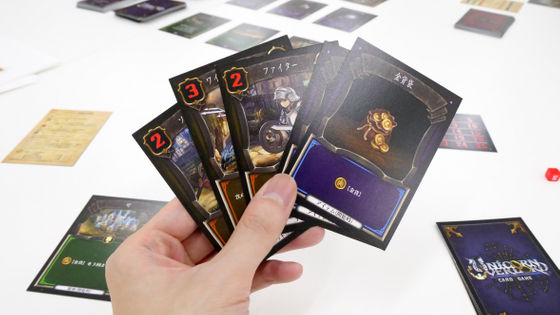'Eden's Shadow' is a competitive board game in which seven heroes save the world from the forces of fallen angels and demons. Game preparation and rules summary

Domina Games, which has released card games such as '
Eden's Shadow - Domina Games
https://www.dominagames.com/edensshadow/
·table of contents
◆1: Eden's Shadow packaging and contents
◆2: Preparing for the game
◆3: Explanation of the 'Magic Board' that is important for gameplay
◆4: How to play the game
◆5: Start Phase and Support Phase
◆6: The 'exploration phase' that determines victory or defeat
◆7: 'Base Phase' to prepare for the next round
◆8: Round End Processing
◆1: Eden's Shadow packaging and contents
The Eden's Shadow package looks like this.

The game is suitable for 1 to 4 players, has a play time of 30 to 120 minutes, and is intended for ages 12 and up.

The contents include a rules manual, one main board, and four individual boards.

There are 85 Magic Ore cubes, 55 Philosopher's Stone cubes, 24 player discs, and 1 start player marker.

The cards include 7 character cards, 8 initial item cards, 31 item/exploration cards, 1 final battle card, and 6 demon army cards.

The character cards are as follows:
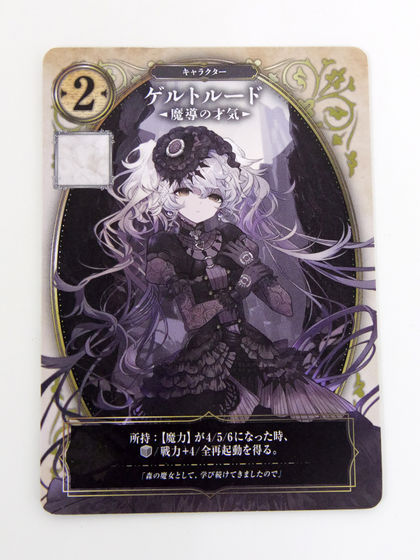
Starting Item Card
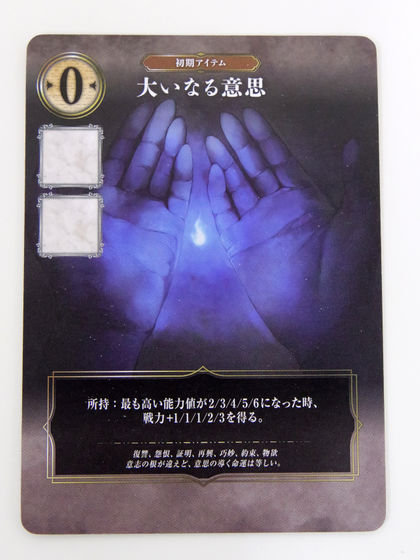
Item/Exploration Card
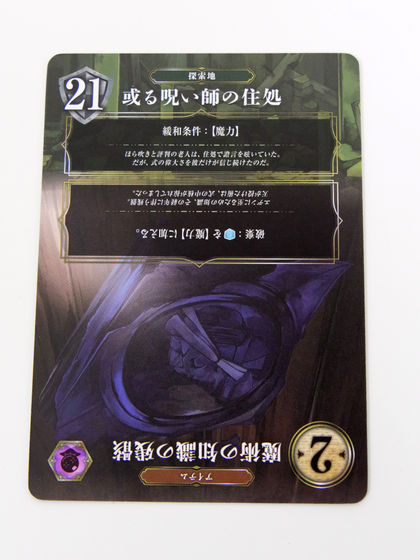
The backs of the item/exploration cards read 'I: Orb Orb,' 'II: Plenamidi,' and 'III: Auradore.'
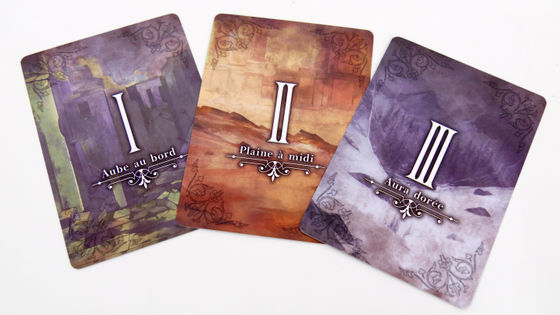
Final Battle Card
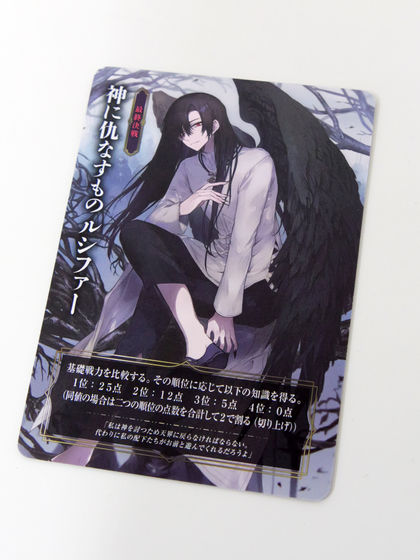
Demon army card
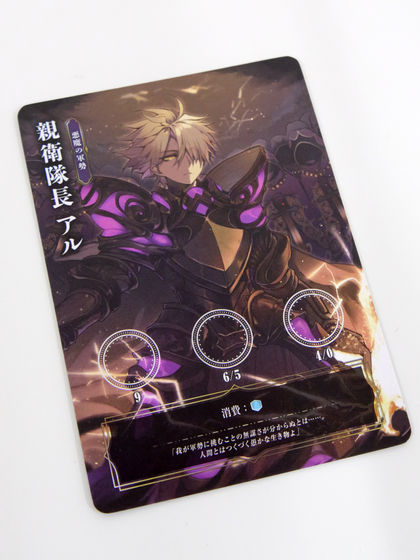
And 105 support cards.

◆2: Preparing for the game
Let's get the game ready. First, place the exploration cards divided into 'I: Orb Orb', 'II: Plenamidi', and 'III: Auradore' face down in the center, then flip over the top five cards of the 'I: Orb Orb' deck and place them next to each other.
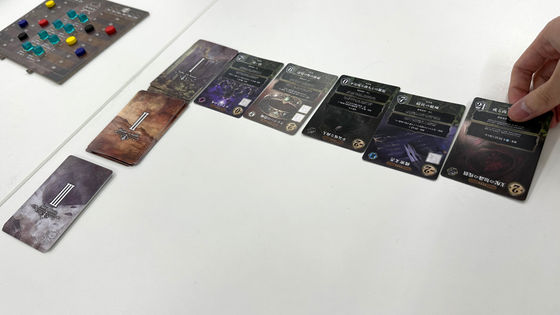
Place the main board and place one blue Philosopher's Stone cube in each of the 'Magical Mine' slots in the center of the main board.
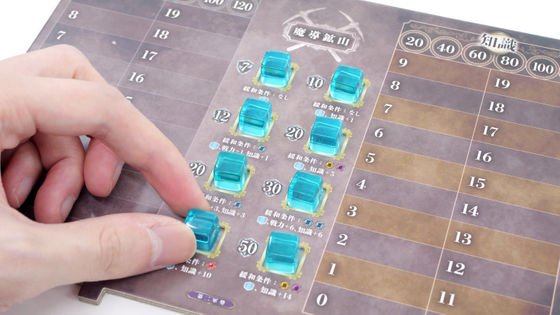
Take two of the demon army cards and place them under the main board. At this time, from the left, they will be called the 'First Army' and the 'Second Army.'

Place the Final Battle card next to the Demon Army cards.
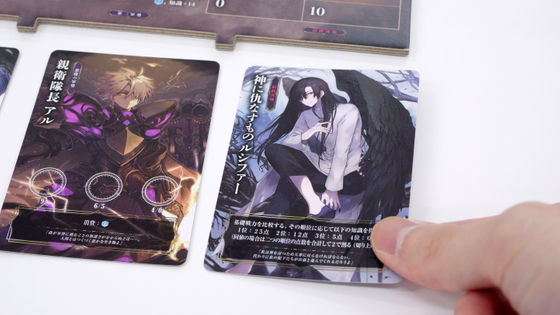
Next, each player chooses one character card of their choice. According to the instructions, 'We recommend that you start by choosing one of the following characters: Geltrude, Villancia, Harmonica, or Victoria.'
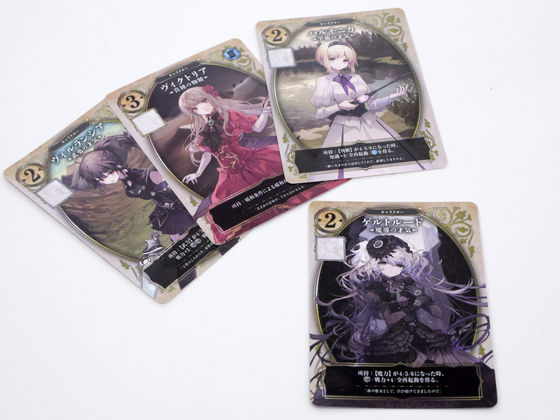
Receive 15 Support Cards corresponding to the characters you selected and stack them face down. The back of each Support Card features an illustration of the character, so you can tell at a glance which Support Card you will use.
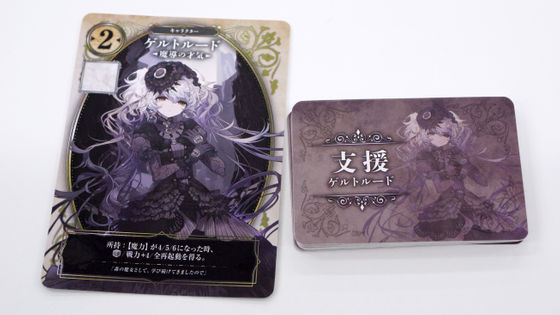
You will also receive a personal board in your choice of color: blue, yellow, black, or red. This personal board is called a 'magic board.'
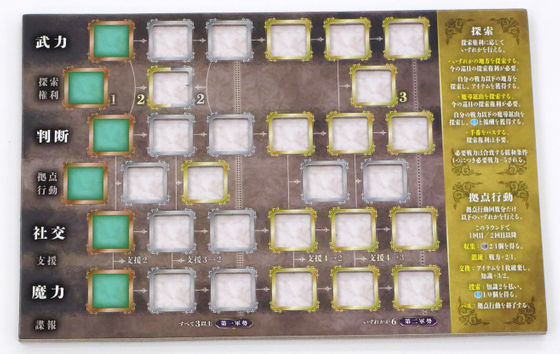
Each player will be given two initial item cards: 'Favorite Equipment' and 'Great Will.'
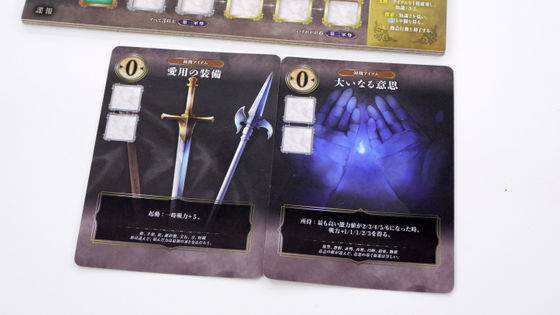
He also receives 7 Magical Ores and 1 Philosopher's Stone and places them on his field.
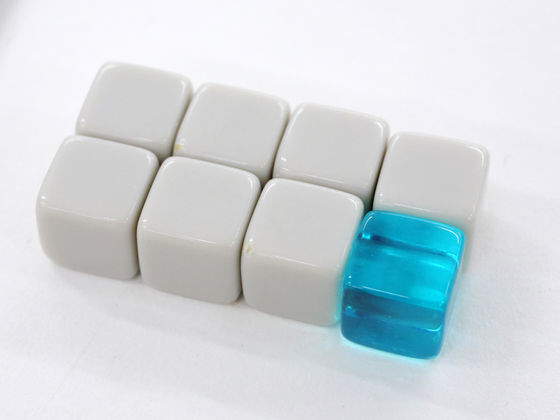
In addition, you receive six disks of your color and place one on each of the 'Strength' and 'Knowledge' tracks on the main board. Keep the remaining disks in your possession.
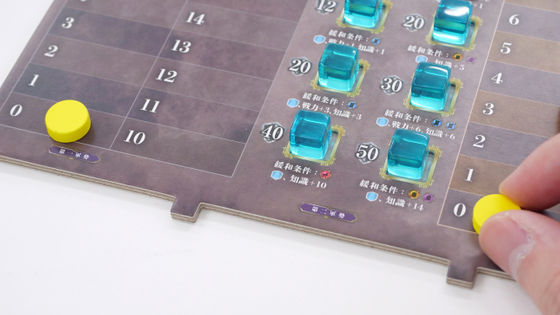
This is what each person looks like after preparing for the game.
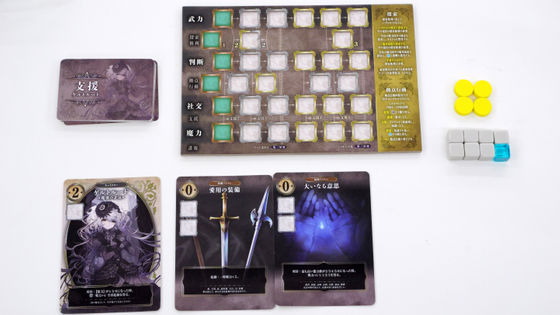
Below is the game setup for four players.

◆3: Explanation of the 'Magic Board' that is important for gameplay
In Eden's Shadow, the player with the most 'knowledge' at the end of all four rounds wins, and each player must explore to gain knowledge, acquire items, and strengthen their forces. To do this, it is important to grow the magic board and increase your own ability scores and the number of times you can take various actions.
Each magic board has four ability values: 'military strength,' 'judgment,' 'sociability,' and 'magic power.' Each player can increase these values by placing magic ores and philosopher's stones on the magic board.
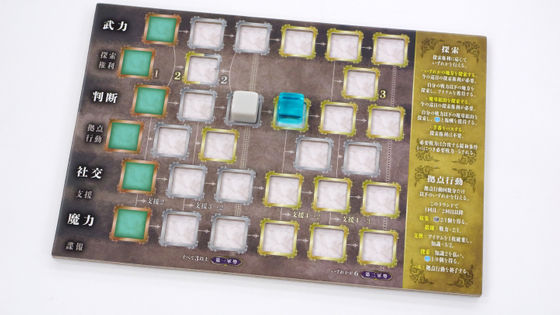
Either Magical Ore or Philosopher's Stone can be placed in the silver frame, but only Philosopher's Stone can be placed in the gold frame.
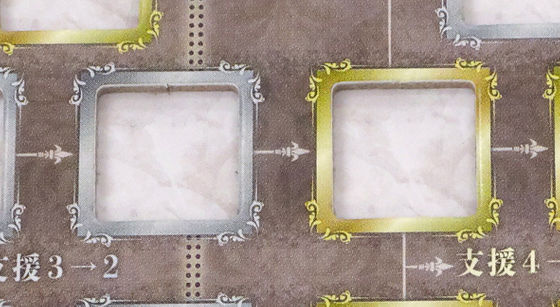
You can place stones at any time during your turn. Therefore, even if you don't have anything to do during your turn in the early stages, it is very important to place stones and advance your growth.
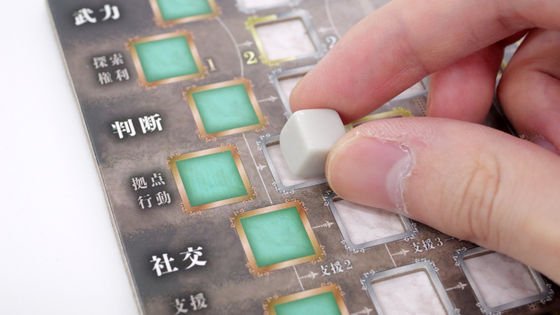
The conditions for placing stones on the magic board are indicated by arrows. In the image below, to place the Philosopher's Stone in the rounded corners, you must place stones in both the 'Judgment' and 'Social' red squares, as indicated by the arrows.
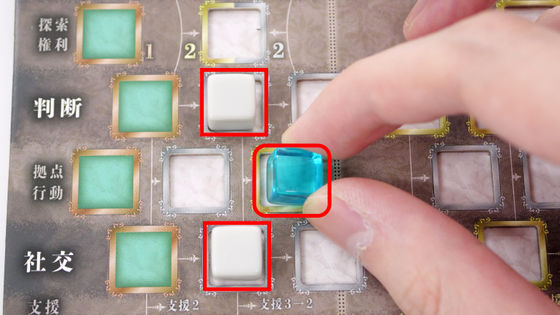
◆4: How to play the game
The game has a total of four rounds. Each round proceeds in the following order: 'Start Phase,' 'Support Phase,' 'Exploration Phase,' 'Base Phase,' and 'End of Round Processing.' In the fourth round, instead of the end of round processing, a phase called 'Final Battle' is processed. This final battle phase is used to calculate the points at the end of the game, and the player with the most 'knowledge' at the end of the final battle wins.
◆5: Start Phase and Support Phase
The procedure for each round is as follows: First, all players turn all of their cards vertically. This is the 'start phase.'
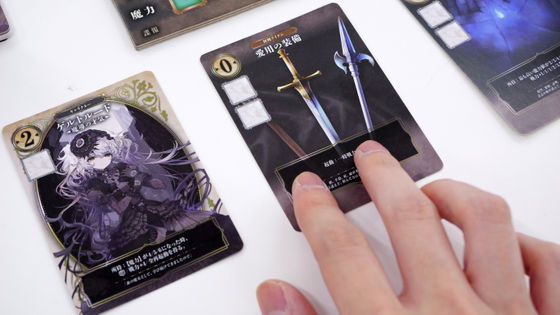
In the following 'Support Phase', all players draw support cards from their deck. At the beginning, you can draw two support cards from the top of your deck.
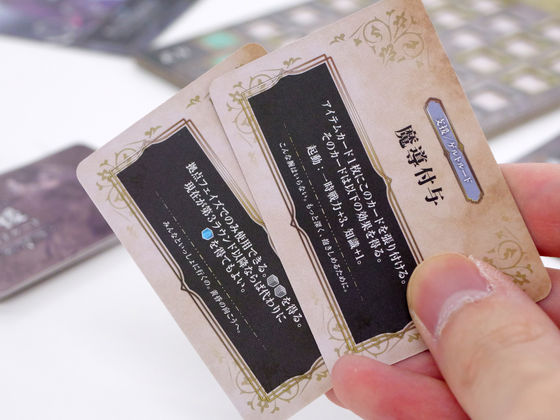
The way you draw support cards will evolve into a more advantageous way as you develop your 'Judgment' and 'Social' skills.

For example, if you have a Magical Ore or Philosopher's Stone placed on your Magical Board as shown below, you can draw three cards from the top of your deck, choose two to add to your hand, and return the remaining card to the bottom of your deck.
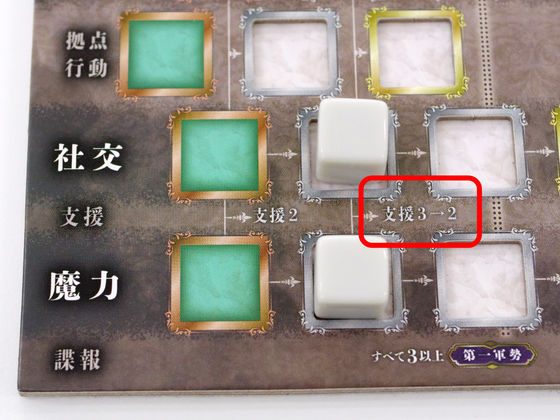
Also, if the stones are placed as shown below, draw four cards from the top of the deck, choose two to add to your hand, and return the remaining two to the bottom of the deck.
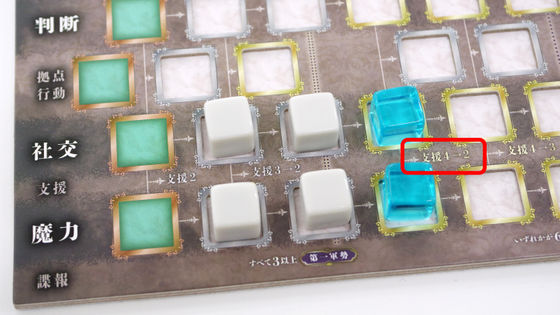
In addition, if you draw five cards from the top of your deck, choose three to add to your hand, and return the remaining two to the bottom of your deck, your Spellboard will look like this:
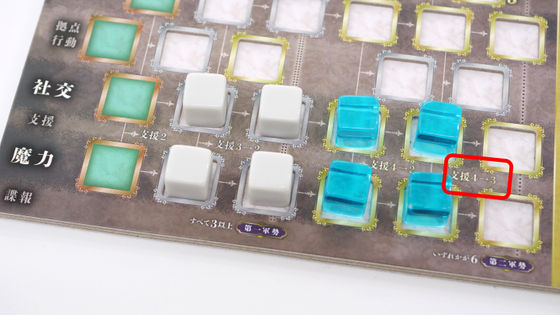
◆6: The 'exploration phase' that determines victory or defeat
In the 'Exploration Phase', players take turns exploring, starting with the starting player. During exploration, players choose one of the following actions: 'Acquire an Item', 'Explore the Magical Mine', or 'Pass Your Turn'.
In the initial state, each player is given the right to explore once, but it is possible to increase the number of exploration rights by filling the magic board as follows. In this case, the right to explore becomes three times.
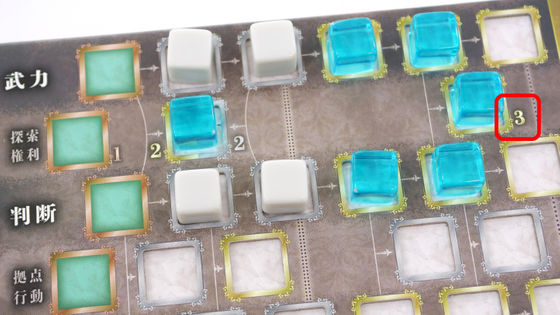
・Acquiring items
The disks placed on the 'Strength' track on the main board represent your current strength.
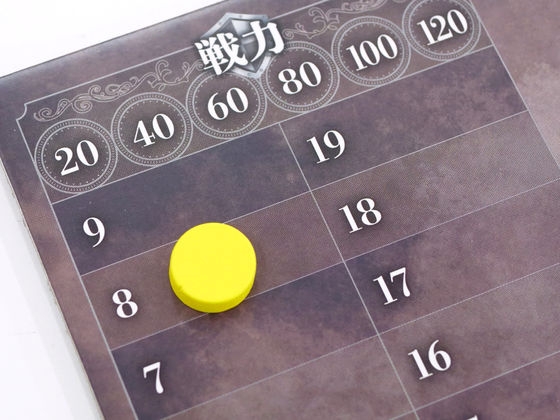
The number written in the upper left corner of the exploration card is the strength required to acquire it. In this case, you can acquire it if your strength is 7 or more.
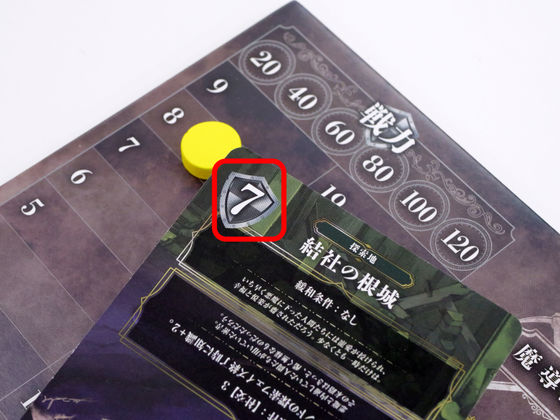
The exploration card you acquire can be turned upside down and treated as an 'item card.' The item cards you acquire are placed on your field.
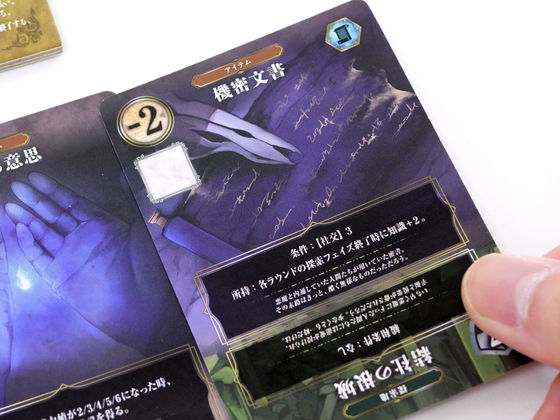
When a search card is acquired and an empty space is filled, a card from the deck is flipped over to replenish it.
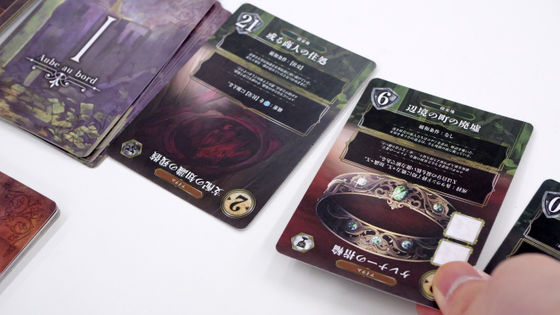
- Exploring the Magical Mines
The number written to the left of the Philosopher's Stone cube on the main board indicates the strength required to acquire it. For example, if you want to acquire a '7' Philosopher's Stone, you need a strength of 7 or more.
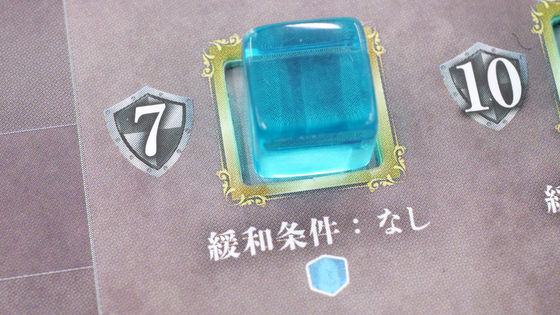
In some magical mines, there is a 'reward' for successfully acquiring a Philosopher's Stone. In this case, the reward is to increase your combat power and knowledge by +1.
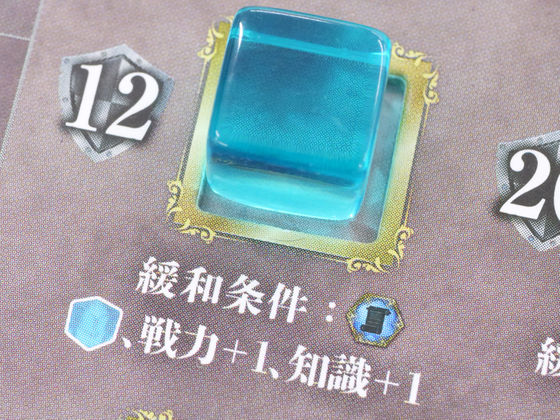
- 'Relaxation conditions' that are important for searching for items and magical mines
Each character and item has an 'attribute.' Attributes are shown in the upper right corner of the card, and there are six types: 'martial arts,' 'magic,' 'information,' 'oracle,' 'vice,' and 'legend.'

Some items and magic mines have 'mitigation conditions.' The following items have the purple 'magic' written on them as a mitigation condition.
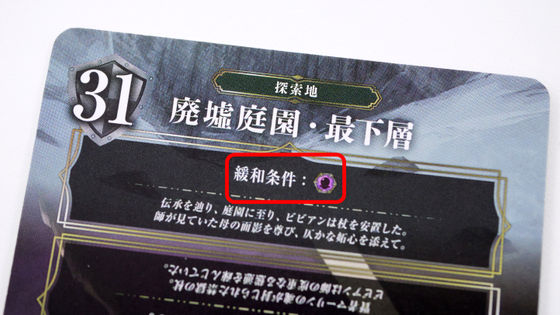
If you have a character or item with the 'Magic' attribute, you will meet the mitigation conditions. When the mitigation conditions are met, the strength required to acquire the item will decrease by 5 for each attribute. In this case, the original strength required is 31, but by meeting the mitigation conditions, the strength required to acquire the item will decrease to 26. Therefore, collecting many attributes and meeting the mitigation conditions is a shortcut to acquiring powerful items and magic mines.
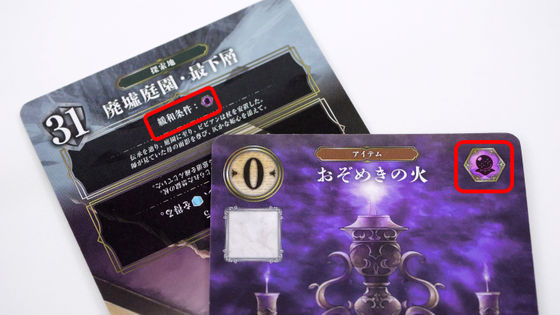
・Passing your turn
If you do not have the right to explore, or if there are no items or Philosopher's Stones to acquire, you will have to pass on your turn.
In the exploration phase, each player performs these actions once, up to a maximum of four times. After performing one action, the next player's turn passes, and if the player has the right to explore when their turn comes around, they will explore.

◆7: 'Base Phase' to prepare for the next round
During the Base Phase, you can choose and perform one of the following 'Base Actions.'
・'Collect' to get 2 magic ores
・'Training' increases your fighting power by 2
- 'Exchange' to increase knowledge by 3 in exchange for discarding one item you have
- 'Search' to reduce knowledge by 2 and gain 1 Philosopher's Stone
・'Pass' to pass your turn to the next player
The number of actions you can take in the base phase increases by filling up the magic board, just like in the exploration phase. In the following cases, you can only take two actions.
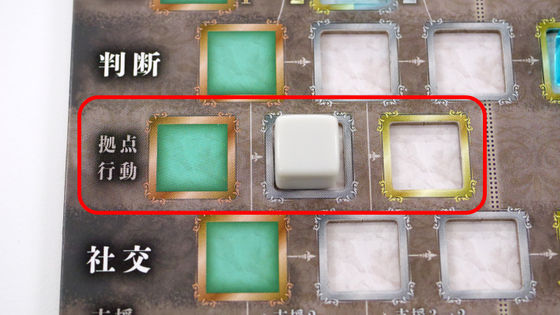
Unlike the exploration phase, the base phase is where each player takes their maximum number of actions at once. Once a series of actions is completed, the next player takes their turn.

◆8: Round End Processing
When the base phase is over, the round end process is performed. If it is the first round, take four cards from the deck with the 'Ⅱ' backside of the exploration destination card and line them up face up. If it is the second round, take three cards from the deck with the 'Ⅲ' backside and line them up face up. In other words, you can tell what round you are in by looking at the row of exploration items.
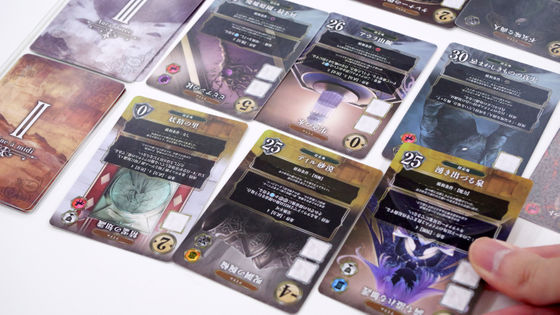
Eden's Shadow is also available on Amazon.co.jp and can be purchased for 4,950 yen including tax at the time of writing.
Amazon | Domina Games Eden's Shadow (1-4 players, 30-120 minutes, ages 12 and up) Board Games | Board Games | Toys
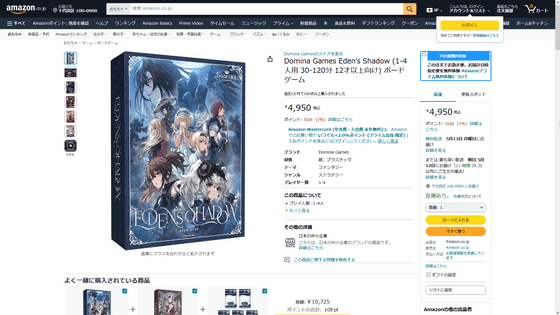
Related Posts:





